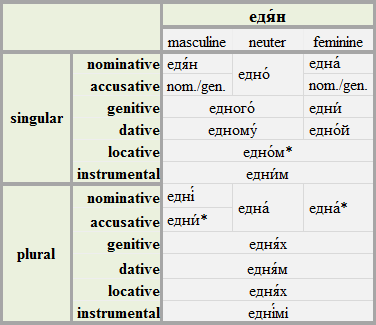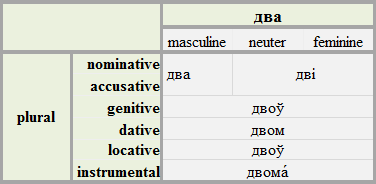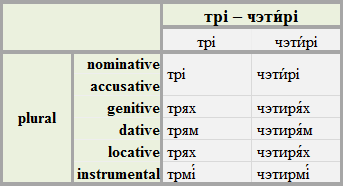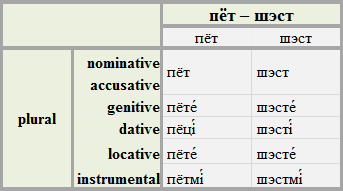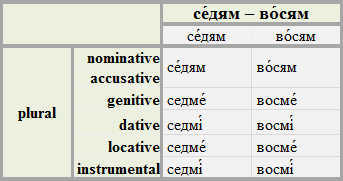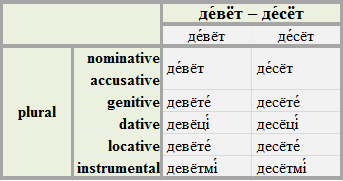Cissian
- Heinrich von Preußen
- rupestrian

- Posts: 22
- Joined: 06 Jan 2013 22:26
Re: Cissian
I'll answer later too (Im not at home), and now I, d like only how Cissian alphabet looked before roforms in 1919.
Und kann ich um einen beispielhaften Text bitten? :)
Und kann ich um einen beispielhaften Text bitten? :)
Pieśń Arjów!
Re: Cissian
I disagree. Why do you think that? I agree with this:Henryk Pruthenia wrote:And, BTW, this, how Cyrillic script have been adopted for smaller languages of Russia is very, very bad argument.
ixals wrote:Also what Frislander said about the Circassian language: A letter can get a new sound value when the script is adapted by another language, but in this case I didn't do that so what Cissian does isn't even that "weird".
That's what I was trying to say. Sometimes, even in natural languages, the changes we expect to happen don't always happen.Henryk Pruthenia wrote:I'm just corious, why "sʲtʲ" have become unchanged, when "tʲ" not.
ixals wrote:/stʲ/ doesn't change because I wanted to have some more native words that didn't change /tʲ/ into /t͡sʲ/. I think I once read about a language that did it similarly.
Was that really necessary? Do you think we're trying to antagonize you?Henryk Pruthenia wrote:Ajm soł sori for maj inglisz. It iz wery bad.
At least for me, your English isn't the problem. You don't speak/write poorly. However, your logic is what's hard to comprehend. We're just trying to understand where you're coming from.
The user formerly known as "shimobaatar".
(she)
(she)
Re: Cissian
This may be an age thing. In the Latin, German, and Ancient Greek books I had access to back in high school, it was always:ixals wrote:I know the order of cases is different for most Slavic languages but the English-speakers' order is more pleasing to my eye. I'm also more used to this order and my native language German does it like this as well. The accusative not coming right after the nominative is very weird to me because it is a very common case.Henryk Pruthenia wrote:And I can't understand, why all English-speakers use this order of cases? :P
nom.
gen.
dat.
acc.
(abl. (L.))
When I came back to such books years later, in German at least, there seemed to be a paradigm shift to nom./acc./gen./dat., which messed with my head at first and is still a little jarring. Online, I found both ngda and nagd for both Latin and Ancient Greek; Slavic resources I have stick with ngda, but even there, I found one nagd declension chart for Russian (looked like it was aimed at L2 learners).
There's a method to the madness, I guess. Nominative and accusative forms are often the same:
German feminines, neuters, and plurals.
Latin neuters; 3rd, 4th, and 5th declension plurals.
Russian neuters and inanimate masculines.
etc.
Too, nagd is the order you might want to introduce the cases in if you were teaching an L2 (First, making sentences with subjects; then, making sentences with subjects and direct objects).
Still, one is often most comfortable with what one's teethed on, so English-speaking me of a certain age is more accustomed to ngda, while German ixals who, I'll hazard a guess, is rather younger than I prefers nagd.
☯ 道可道,非常道
☯ 名可名,非常名
☯ 名可名,非常名
-
Ashtăr Balynestjăr
- cuneiform

- Posts: 195
- Joined: 18 Jan 2017 07:17
Re: Cissian
In the end it's mostly a matter of convention. For my conlang Caelian, I use Nom - Acc - Dat - Gen, while for Paatherye I use Nom - Gen - Dat - Acc. I actually never questioned that logic before reading this thread.
Wipe the glass. This is the usual way to start, even in the days, day and night, only a happy one.
- KaiTheHomoSapien
- greek

- Posts: 641
- Joined: 15 Feb 2016 06:10
- Location: Northern California
Re: Cissian
I use this grouping too, only switching "gen. loc." with "dat. abl. inst.". The reason being that these form syncretic groups in my conlang, but I based this order on PIE reconstructions. nom/voc/acc are the "strong" cases. The rest are "weak", with "dat/abl/inst" sharing some plural forms and "gen/loc" sharing a dual.Ashtăr Balynestjăr wrote:I use nom.-voc.-acc.-inst.-dat.-abl.-gen.-loc.
Sorry to derail your conlang thread. I like it, though, including the Cyrillic orthography :)

Re: Cissian
Comments:
Text 1: Schleicher's Fable
Henryk Pruthenia asked for a text, so I translated Schleicher's Fable. The English translation used here is a bit different compared to the official translation here, because I want it to be as close as possible to the Cissian one. I also want to add that I made some smaller changes. Instead of /v/, в is now generally pronounced as /ʋ/. And I replaced the letter ґ with ғ, mainly because ғ sticks out more. I couldn't see the difference between г and ґ in my dictionary and it bothered me a bit. I think that was all, so here is Schleicher's Fable:
Войца и Конi
На мағурi войца, ктера нема влнэ, увiдяла-е конi - едян тёгнэл-е тёжки воз, други несл-е велiки тегрет, и трецi брзо несл-е мэшiнэ.
Войца рекла-е конем: «Сярцэ мё болi, коди вisiм, как чловяк езi конямi». Конi реклi-сэ: «Слушай, войца, нас боля сярца, коди вisiмо,
как чловяк, гпан, бере войцэ влна и творi сi з нi тёплэ рухо. А войца нема влнэ». Услушавши то, войца побяжала-е в поле.
/ʋoi̯ˈt͡sa i ˈko.nʲi
na maˈgu.rʲi ʋoi̯ˈt͡sa kʲtʲeˈra nʲeˈma ˈʋl̩.ne uˈʋʲi.dʲa.la.je ˈko.nʲi | jeˈdʲan tʲoˈɦne.lʲe ˈtʲo.ʃki ʋos druˈɦi ˈnʲe.sʲlʲe ʋʲeˈlʲiki ˈtʲe.ɦʲrʲet i ˈtʲrʲe.t͡sʲi ˈbr̩.zo ˈnʲe.sʲlʲe meˈʃʲi.ne |
ʋoi̯ˈt͡sa rʲeˈkla.je ˈko.nʲem ˈsʲar.t͡se mʲo boˈlʲi koˈdi ˈʋʲi.d͡zʲim kak ˈje.zʲi ˈko.nʲa.mʲi | ˈko.nʲi rʲeˈkʲlʲi.se ˈslu.ʃai̯ ʋoi̯ˈt͡sa nas boˈlʲa sʲarˈt͡sa koˈdi ˈʋʲ.d͡zʲi.mo
kak t͡ʃloˈʋʲak ɦpan bʲeˈrʲe ʋoi̯ˈt͡se ˈʋl̩.na i tfoˈrʲi sʲiːz nʲi ˈtʲo.ple ˈru.xo | a ʋoi̯ˈt͡sa nʲeˈma ˈʋl̩.ne | uˈslu.ʃau̯.ʃi to ʋoi̯ˈt͡sa po.bʲaˈʒa.la.je u̯ ˈpo.lʲe/
The Sheep and the Horses
On a hill, a sheep which has no wool saw horses - one pulled a heavy cart, the second carried a big load, and the third carried a man quickly.
The sheep said to the horses: "My heart pains me, when I see how a man is riding horses." The horses said: "Hear, sheep, our hearts pain us when we see
how a man, the master, takes a sheep's wool and makes a warm garment for himself out of it. And the sheep has no wool." Having heard this, the sheep ran into the field.
Romanisation:
Gloss:
На мағурi войца, ктера нема влнэ, увiдяла-е конi - едян тёгнэл-е тёжки воз, други несл-е велiки тегрет, и трецi брзо несл-е мэшiнэ.
Na magúrji vojcá, ktjerá njemá vĺne, uvjídjala-je kónji - jedján tjohnél-je tjóžki voz, druhí njesl-je vjeljíki tjéhrjet, i trjécji bŕzo njesl-je mešjíne.
on hill-LOC sheep-SG.NOM which-SG.F.NOM not.have-3SG wool-SG.GEN PRF-see-PST-F.SG=be.3SG.PRS horse-PL.ACC | one.SG.M.NOM pull-PST=be.3SG.PRS heavy-SG.M.ACC
cart(-SG.ACC) second/other-SG.M.NOM carry.CONC-PST=be.3SG.PRS big-SG.M.ACC load(-SG.ACC) and third-SG.M.NOM quick-ADV carry.CONC-PST=be.3SG.PRS man-SG.ACC
Войца рекла-е конем: «Сярцэ мё болi, коди вisiм, как чловяк езi конямi». Конi реклi-сэ: «Слушай, войца, нас боля сярца, коди вisiмо,
Vojcá rjeklá-je kónjem: "Sjárce mjo boljí, kodí vjídzjim, kak človják jézji kónjamji." Kónji rjekljí-se: "Slúšaj, vojcá, nas boljá sjarcá, kodí vjídzjimo,
sheep-SG.NOM say.PRF-PST-SG.F=be.3SG.PRS horse-PL.DAT | heart-SG.NOM 1SG.ACC hurt-3SG when see-1SG how human-SG.NOM ride.ABST-3SG horse-PL-INST | horse-PL-NOM
say.PRF-PST-PL.M=be.3PL.PRS | hear-2SG.IMPR sheep-SG.NOM 1PL.ACC hurt-3PL heart.PL.NOM when see-1PL
как чловяк, гпан, бере войцэ влна и творi сi з нi тёплэ рухо. А войца нема влнэ». Услушавши то, войца побяжала-е в поле.
kak človják, hpán, bjerjé vojcé vĺna i tvorjí sji iz nji tjóple rúxo. A vojcá njemá vĺne." Uslúšavši to, vojcá pobjažála-je v pólje.
how human-SG.NOM | master-SG.NOM | take-3SG sheep-SG.GEN wool-SG.ACC and make-3SG REFL.DAT from 3SG.F.GEN warm-SG.N.ACC garment-SG.ACC | and
sheep-SG.NOM not.have-3SG wool-SG.GEN | PRF-hear-PST.ADV-SG.M this-SG.N.ACC | sheep-SG.NOM PRF-run.CONC-PST-SG.F=be.3SG.PRS in field-SG.ACC
Spoiler:
Henryk Pruthenia asked for a text, so I translated Schleicher's Fable. The English translation used here is a bit different compared to the official translation here, because I want it to be as close as possible to the Cissian one. I also want to add that I made some smaller changes. Instead of /v/, в is now generally pronounced as /ʋ/. And I replaced the letter ґ with ғ, mainly because ғ sticks out more. I couldn't see the difference between г and ґ in my dictionary and it bothered me a bit. I think that was all, so here is Schleicher's Fable:
Войца и Конi
На мағурi войца, ктера нема влнэ, увiдяла-е конi - едян тёгнэл-е тёжки воз, други несл-е велiки тегрет, и трецi брзо несл-е мэшiнэ.
Войца рекла-е конем: «Сярцэ мё болi, коди вisiм, как чловяк езi конямi». Конi реклi-сэ: «Слушай, войца, нас боля сярца, коди вisiмо,
как чловяк, гпан, бере войцэ влна и творi сi з нi тёплэ рухо. А войца нема влнэ». Услушавши то, войца побяжала-е в поле.
/ʋoi̯ˈt͡sa i ˈko.nʲi
na maˈgu.rʲi ʋoi̯ˈt͡sa kʲtʲeˈra nʲeˈma ˈʋl̩.ne uˈʋʲi.dʲa.la.je ˈko.nʲi | jeˈdʲan tʲoˈɦne.lʲe ˈtʲo.ʃki ʋos druˈɦi ˈnʲe.sʲlʲe ʋʲeˈlʲiki ˈtʲe.ɦʲrʲet i ˈtʲrʲe.t͡sʲi ˈbr̩.zo ˈnʲe.sʲlʲe meˈʃʲi.ne |
ʋoi̯ˈt͡sa rʲeˈkla.je ˈko.nʲem ˈsʲar.t͡se mʲo boˈlʲi koˈdi ˈʋʲi.d͡zʲim kak ˈje.zʲi ˈko.nʲa.mʲi | ˈko.nʲi rʲeˈkʲlʲi.se ˈslu.ʃai̯ ʋoi̯ˈt͡sa nas boˈlʲa sʲarˈt͡sa koˈdi ˈʋʲ.d͡zʲi.mo
kak t͡ʃloˈʋʲak ɦpan bʲeˈrʲe ʋoi̯ˈt͡se ˈʋl̩.na i tfoˈrʲi sʲiːz nʲi ˈtʲo.ple ˈru.xo | a ʋoi̯ˈt͡sa nʲeˈma ˈʋl̩.ne | uˈslu.ʃau̯.ʃi to ʋoi̯ˈt͡sa po.bʲaˈʒa.la.je u̯ ˈpo.lʲe/
The Sheep and the Horses
On a hill, a sheep which has no wool saw horses - one pulled a heavy cart, the second carried a big load, and the third carried a man quickly.
The sheep said to the horses: "My heart pains me, when I see how a man is riding horses." The horses said: "Hear, sheep, our hearts pain us when we see
how a man, the master, takes a sheep's wool and makes a warm garment for himself out of it. And the sheep has no wool." Having heard this, the sheep ran into the field.
Romanisation:
Spoiler:
На мағурi войца, ктера нема влнэ, увiдяла-е конi - едян тёгнэл-е тёжки воз, други несл-е велiки тегрет, и трецi брзо несл-е мэшiнэ.
Na magúrji vojcá, ktjerá njemá vĺne, uvjídjala-je kónji - jedján tjohnél-je tjóžki voz, druhí njesl-je vjeljíki tjéhrjet, i trjécji bŕzo njesl-je mešjíne.
on hill-LOC sheep-SG.NOM which-SG.F.NOM not.have-3SG wool-SG.GEN PRF-see-PST-F.SG=be.3SG.PRS horse-PL.ACC | one.SG.M.NOM pull-PST=be.3SG.PRS heavy-SG.M.ACC
cart(-SG.ACC) second/other-SG.M.NOM carry.CONC-PST=be.3SG.PRS big-SG.M.ACC load(-SG.ACC) and third-SG.M.NOM quick-ADV carry.CONC-PST=be.3SG.PRS man-SG.ACC
Войца рекла-е конем: «Сярцэ мё болi, коди вisiм, как чловяк езi конямi». Конi реклi-сэ: «Слушай, войца, нас боля сярца, коди вisiмо,
Vojcá rjeklá-je kónjem: "Sjárce mjo boljí, kodí vjídzjim, kak človják jézji kónjamji." Kónji rjekljí-se: "Slúšaj, vojcá, nas boljá sjarcá, kodí vjídzjimo,
sheep-SG.NOM say.PRF-PST-SG.F=be.3SG.PRS horse-PL.DAT | heart-SG.NOM 1SG.ACC hurt-3SG when see-1SG how human-SG.NOM ride.ABST-3SG horse-PL-INST | horse-PL-NOM
say.PRF-PST-PL.M=be.3PL.PRS | hear-2SG.IMPR sheep-SG.NOM 1PL.ACC hurt-3PL heart.PL.NOM when see-1PL
как чловяк, гпан, бере войцэ влна и творi сi з нi тёплэ рухо. А войца нема влнэ». Услушавши то, войца побяжала-е в поле.
kak človják, hpán, bjerjé vojcé vĺna i tvorjí sji iz nji tjóple rúxo. A vojcá njemá vĺne." Uslúšavši to, vojcá pobjažála-je v pólje.
how human-SG.NOM | master-SG.NOM | take-3SG sheep-SG.GEN wool-SG.ACC and make-3SG REFL.DAT from 3SG.F.GEN warm-SG.N.ACC garment-SG.ACC | and
sheep-SG.NOM not.have-3SG wool-SG.GEN | PRF-hear-PST.ADV-SG.M this-SG.N.ACC | sheep-SG.NOM PRF-run.CONC-PST-SG.F=be.3SG.PRS in field-SG.ACC
Native: 
Learning: ,
,  ,
,  ,
, 
Zhér·dûn a tonal Germanic conlang
old stuff: Цiски | Noattȯč | Tungōnis Vīdīnōs
Learning:
Zhér·dûn a tonal Germanic conlang
old stuff: Цiски | Noattȯč | Tungōnis Vīdīnōs
Re: Cissian
Thank you, shimo! It took me a whole evening though. ![:$ [:$]](./images/smilies/icon_redface2.png)
Nouns 2: Irregular Nouns
Retained Duals
There are four nouns (so far) that have retained the Proto-Slavic dual. They are not used as dual forms however, they replaced the plural form completely. All of these four nouns are body parts that exist two times on the human body, that's why the dual came to be used instead of the plural. These nouns are во́ко/vóko ("eye"), у́хо/úcho ("ear"), нога́/nohá ("leg/foot") and рэка́/reká ("arm/hand").
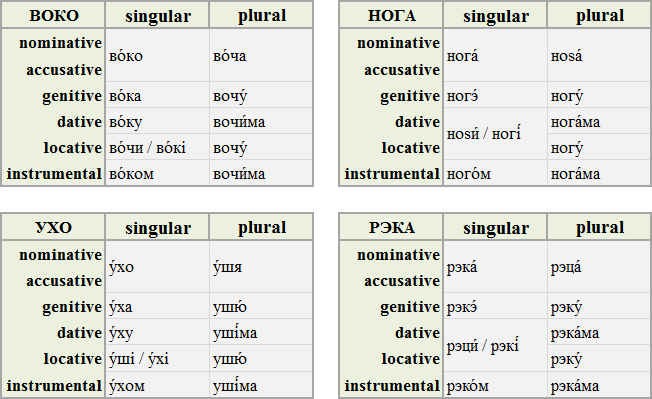
As seen, a notable feature of these nouns is that they also undergo consonant changes due to Slavic palatalisations. The two neuters change in the plural and the locative singular (vok- > voč- ; ux- > ušj-), although colloquially this form is regular, and the two feminines in dative/locative singular and nominative/accusative plural (noh- > nodz- ; rek- > rec-).
Monosyllabic Masculines
Another "regular" irregularity are monosyllabic masculines. I saw this in Serbo-Croation and I liked it so I wanted Cissian to have it as well with little changes. The only difference are the plural forms with their added infix before the case suffix. Depending on the masculine noun class, this suffix is either -ов/-ov, -эв/-ev or -ев/-jev. An exception is the genitive as it already has that suffix is normal masculines nouns. An example for a noun like this is ас/as ("ace"), a German loan.
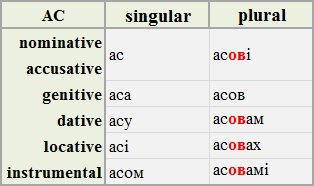
Not every monosyllabic masculine is declined like this though. It is also not possible to identify whether a word has a long or a short plural. So far, only two nouns have a long plural. Ас/as ("ace") and град/hrad ("castle, fortress (rarely: town, city)"). I will try to add more nouns featuring this irregularity in a spoiler below later on.
Nouns 2: Irregular Nouns
Retained Duals
There are four nouns (so far) that have retained the Proto-Slavic dual. They are not used as dual forms however, they replaced the plural form completely. All of these four nouns are body parts that exist two times on the human body, that's why the dual came to be used instead of the plural. These nouns are во́ко/vóko ("eye"), у́хо/úcho ("ear"), нога́/nohá ("leg/foot") and рэка́/reká ("arm/hand").

As seen, a notable feature of these nouns is that they also undergo consonant changes due to Slavic palatalisations. The two neuters change in the plural and the locative singular (vok- > voč- ; ux- > ušj-), although colloquially this form is regular, and the two feminines in dative/locative singular and nominative/accusative plural (noh- > nodz- ; rek- > rec-).
Monosyllabic Masculines
Another "regular" irregularity are monosyllabic masculines. I saw this in Serbo-Croation and I liked it so I wanted Cissian to have it as well with little changes. The only difference are the plural forms with their added infix before the case suffix. Depending on the masculine noun class, this suffix is either -ов/-ov, -эв/-ev or -ев/-jev. An exception is the genitive as it already has that suffix is normal masculines nouns. An example for a noun like this is ас/as ("ace"), a German loan.

Not every monosyllabic masculine is declined like this though. It is also not possible to identify whether a word has a long or a short plural. So far, only two nouns have a long plural. Ас/as ("ace") and град/hrad ("castle, fortress (rarely: town, city)"). I will try to add more nouns featuring this irregularity in a spoiler below later on.
Native: 
Learning: ,
,  ,
,  ,
, 
Zhér·dûn a tonal Germanic conlang
old stuff: Цiски | Noattȯč | Tungōnis Vīdīnōs
Learning:
Zhér·dûn a tonal Germanic conlang
old stuff: Цiски | Noattȯč | Tungōnis Vīdīnōs
- Heinrich von Preußen
- rupestrian

- Posts: 22
- Joined: 06 Jan 2013 22:26
Re: Cissian
Reply:
So yeah, it's been almost a month and I had this post ready for some weeks but I was too lazy to finish it and I always told myself that I'll do it later. So today I'll finally get myself to do that. It's a shorter post again, but at least it's something! ![:D [:D]](./images/smilies/icon_biggrin2.png) The program I used to work with suddenly thought it was a nice idea to not work anymore so I tried to reinstall it but I can't install it anymore so I really thought I lost everything for a second. Luckily I managed to switch programs but I am not happy with the one I am using right now which takes a bit of the fun away, for me at least.
The program I used to work with suddenly thought it was a nice idea to not work anymore so I tried to reinstall it but I can't install it anymore so I really thought I lost everything for a second. Luckily I managed to switch programs but I am not happy with the one I am using right now which takes a bit of the fun away, for me at least. ![:( [:(]](./images/smilies/icon_sad2.png)
Adjectives 1: Declension
Just as it's done with nouns, Cissian adjectives are declined for case, number and gender. The adjectival declension is at least simpler since the plural forms don't differentiate gender at all except for one exception and the singular has many forms that share endings with other genders. Cissian also doesn't feature a distinction of indefinite and definite forms like Serbo-Croatian. There is also only one declension as opposed to all the noun declension that exist. But some adjectives are "a bit irregular" if the last consonant is a soft consonant. An example of this is ри́џi (rídzji, meaning "reddish, ginger (hair)") which actually declines like a regular adjective, but due to the palatalised consonant some cases merge and this softness is also very apparent in the orthography. The second tables shows the endings for such an adjective. It is also very easy to identify if an adjective if soft or not because soft adjectives always end in -i whereas normal adjectives end in -и.
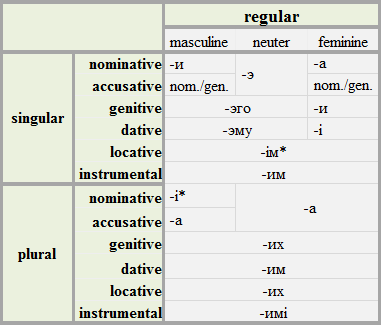
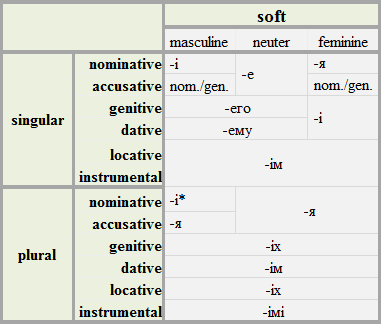
Nothing more for now, but I am still working on Cissian (which surprises me a bit!)![:D [:D]](./images/smilies/icon_biggrin2.png)
Spoiler:
Adjectives 1: Declension
Just as it's done with nouns, Cissian adjectives are declined for case, number and gender. The adjectival declension is at least simpler since the plural forms don't differentiate gender at all except for one exception and the singular has many forms that share endings with other genders. Cissian also doesn't feature a distinction of indefinite and definite forms like Serbo-Croatian. There is also only one declension as opposed to all the noun declension that exist. But some adjectives are "a bit irregular" if the last consonant is a soft consonant. An example of this is ри́џi (rídzji, meaning "reddish, ginger (hair)") which actually declines like a regular adjective, but due to the palatalised consonant some cases merge and this softness is also very apparent in the orthography. The second tables shows the endings for such an adjective. It is also very easy to identify if an adjective if soft or not because soft adjectives always end in -i whereas normal adjectives end in -и.


- The singular locative merges with the instrumental for regular adjectives in colloquial speech because they are similar sounding and as they are already the same for soft adjectives. The form used for both is -им.
- Another common colloquial thing to do is the change from nominative plural -i to -a (or -я for soft adjectives). This results in a shared plural declension for all three genders which already exists in other Slavic languages.
Nothing more for now, but I am still working on Cissian (which surprises me a bit!)
Native: 
Learning: ,
,  ,
,  ,
, 
Zhér·dûn a tonal Germanic conlang
old stuff: Цiски | Noattȯč | Tungōnis Vīdīnōs
Learning:
Zhér·dûn a tonal Germanic conlang
old stuff: Цiски | Noattȯč | Tungōnis Vīdīnōs
Re: Cissian
Old version of this post:
Cardinal numbers
work in progress
All numbers are listed in their nominative form.
1. едян* yedyán /jeˈɟan/
2. два* dva /ˈdʋa/
3. трi tryi /ˈtri/
4. чотырi čotéryi /t͡ʂoˈtɛr.ji/
5. пет pyet /ˈpʲet/
6. шыст šest /ˈʂɛst/
7. седям syédyam /ˈsʲe.ɟam/
8. восям vósyam /ˈʋɔ.sʲam/
9. девет dyévyet /ˈdʲe.ʋʲet/
10. десет dyésyet /ˈdʲe.sʲet/
*only masculine form shown
Numbers eleven to nineteen are formed by adding “-надцет” at the end. The “д” is not pronounced and purely etymological.
11. едяннадцет yedyannádcyet /je.ɟaˈna.t͡sʲet/
12. дванадцет dvanádcyet /dʋaˈna.t͡sʲet/
13. трiнадцет tryinádcyet /triˈna.t͡sʲet/
14. чотрнадцет* čotrnádcyet /t͡ʂo.tr̩ˈna.t͡sʲet/
15. петнадцет pyetnádcyet /pʲetˈna.t͡sʲet/
16. шыстнадцет šestnádcyet /ʂestˈna.t͡sʲet/
17. седямнадцет syedyamnádcyet /sʲe.ɟamˈna.t͡sʲet/
18. восямнадцет vosyamnádcyet /ʋo.sʲamˈna.t͡sʲet/
19. деветнадцет dyevyetnádcyet /dʲe.ʋʲetˈna.t͡sʲet/
*“чотырi” irregularly changes to “чотр-” in many derivations
Numbers twenty, thirty and forty are formed by adding “-дцет” to “два”, “трi” and “чотырi”. The remaining tenners are suffixed with “-десят”.
20. двадцет dvádcyet /ˈdʋa.t͡sʲet/
30. трiдцет tryídcyet /ˈtri.t͡sʲet/
40. чотрдцет čotŕdcyet /t͡ʂoˈtr̩.t͡sʲet/
50. петдесят pyetdyesyát /pʲe.dʲeˈsʲat/
60. шыстдесят šestdyesyát /ʂez.dʲeˈsʲat/
70. седямдесят syedyamdyesyát /sʲe.ɟam.dʲeˈsʲat/
80. восямдесят vosyamdyesyát /ʋo.sʲam.dʲeˈsʲat/
90. деветдесят dyevyetdyesyát /dʲe.ʋʲe.dʲeˈsʲat/
Hundred itself is “сто”. Similar to the tenners, the first three hundreds take “-ста” while the others take “-сат”.
100. сто sto /ˈstɔ/
200. двіста* dvyísta /ˈdʲʋʲ.sta/
300. тріста tryísta /ˈtri.sta/
400. чотрста čotŕsta /t͡ʂoˈtr̩.sta/
500. петсат pyetsát /pʲeˈt͡sat/
600. шыстсат* šestsát /ʂesˈt͡sat/
700. седямсат syedyamsát /sʲe.ɟamˈsat/
800. восямсат vosyamsát /ʋo.sʲamˈsat/
900. деветсат dyevyetsát /dʲe.ʋʲeˈt͡sat/
*“двіста”: originally “двістe” but was regularised due to influence by “трістa”
*“шыстсат”: expected pronunciation is /ʂeˈsʲat/ but this irregularity was levelled out, partly because of the conservative spelling
The rest of the numbers is currently being revisited and will be added when it's done.
Spoiler:
work in progress
All numbers are listed in their nominative form.
1. едян* yedyán /jeˈɟan/
2. два* dva /ˈdʋa/
3. трi tryi /ˈtri/
4. чотырi čotéryi /t͡ʂoˈtɛr.ji/
5. пет pyet /ˈpʲet/
6. шыст šest /ˈʂɛst/
7. седям syédyam /ˈsʲe.ɟam/
8. восям vósyam /ˈʋɔ.sʲam/
9. девет dyévyet /ˈdʲe.ʋʲet/
10. десет dyésyet /ˈdʲe.sʲet/
*only masculine form shown
Numbers eleven to nineteen are formed by adding “-надцет” at the end. The “д” is not pronounced and purely etymological.
11. едяннадцет yedyannádcyet /je.ɟaˈna.t͡sʲet/
12. дванадцет dvanádcyet /dʋaˈna.t͡sʲet/
13. трiнадцет tryinádcyet /triˈna.t͡sʲet/
14. чотрнадцет* čotrnádcyet /t͡ʂo.tr̩ˈna.t͡sʲet/
15. петнадцет pyetnádcyet /pʲetˈna.t͡sʲet/
16. шыстнадцет šestnádcyet /ʂestˈna.t͡sʲet/
17. седямнадцет syedyamnádcyet /sʲe.ɟamˈna.t͡sʲet/
18. восямнадцет vosyamnádcyet /ʋo.sʲamˈna.t͡sʲet/
19. деветнадцет dyevyetnádcyet /dʲe.ʋʲetˈna.t͡sʲet/
*“чотырi” irregularly changes to “чотр-” in many derivations
Numbers twenty, thirty and forty are formed by adding “-дцет” to “два”, “трi” and “чотырi”. The remaining tenners are suffixed with “-десят”.
20. двадцет dvádcyet /ˈdʋa.t͡sʲet/
30. трiдцет tryídcyet /ˈtri.t͡sʲet/
40. чотрдцет čotŕdcyet /t͡ʂoˈtr̩.t͡sʲet/
50. петдесят pyetdyesyát /pʲe.dʲeˈsʲat/
60. шыстдесят šestdyesyát /ʂez.dʲeˈsʲat/
70. седямдесят syedyamdyesyát /sʲe.ɟam.dʲeˈsʲat/
80. восямдесят vosyamdyesyát /ʋo.sʲam.dʲeˈsʲat/
90. деветдесят dyevyetdyesyát /dʲe.ʋʲe.dʲeˈsʲat/
Hundred itself is “сто”. Similar to the tenners, the first three hundreds take “-ста” while the others take “-сат”.
100. сто sto /ˈstɔ/
200. двіста* dvyísta /ˈdʲʋʲ.sta/
300. тріста tryísta /ˈtri.sta/
400. чотрста čotŕsta /t͡ʂoˈtr̩.sta/
500. петсат pyetsát /pʲeˈt͡sat/
600. шыстсат* šestsát /ʂesˈt͡sat/
700. седямсат syedyamsát /sʲe.ɟamˈsat/
800. восямсат vosyamsát /ʋo.sʲamˈsat/
900. деветсат dyevyetsát /dʲe.ʋʲeˈt͡sat/
*“двіста”: originally “двістe” but was regularised due to influence by “трістa”
*“шыстсат”: expected pronunciation is /ʂeˈsʲat/ but this irregularity was levelled out, partly because of the conservative spelling
The rest of the numbers is currently being revisited and will be added when it's done.
Last edited by ixals on 05 Feb 2018 23:28, edited 2 times in total.
Native: 
Learning: ,
,  ,
,  ,
, 
Zhér·dûn a tonal Germanic conlang
old stuff: Цiски | Noattȯč | Tungōnis Vīdīnōs
Learning:
Zhér·dûn a tonal Germanic conlang
old stuff: Цiски | Noattȯč | Tungōnis Vīdīnōs
Re: Cissian
I've started to like Cissian's sound changes less and less lately, especially the nasal ones, so I'm giving Cissian's history a little makeover in hopes that it's a bit more realistic. Being inpired by Bulgarian, I also added a new vowel that's currently pronounced /ɘ/ but it's also pronounced as /ə/, /ɵ/ or /ɤ/ depending on the dialect and the speaker.
Sound changes
Some before-and-afters of words that changed:
саўнцэ > стлнцы “sun”
sáunce /ˈsau̯n.t͡se/ > stĺnce /ˈstl̩n.t͡se/
сярцэ > стрдцы “heart”
sjárce /ˈsʲar.t͡se/ > stŕdce /ˈstr̩.t͡se/
этроба > вътроба “womb”
etróba /eˈtro.ba/ > vytróba /ʋɘˈtrɔ.ba/
матка > майтка “mother (dim.)”
mátka /ˈma.tka/ > máytka /ˈmai̯t.ka/
с ѕняздом > с гнездом “with the nest”
s dznjazdóm /z‿d͡zʲnʲaˈzdom/ > s hnyezdóm /sɘ.ɲeˈzd͡zɔm/
Бявград > Белград “Belgrade”
Bjávhrad /ˈbʲau̯.ɦrat/ > Byélhrad /ˈbʲeo̯.rat/
десёт > десет “ten”
djesjót /dʲeˈsʲot/ > dyesyét /ɟeˈsʲet/
малiсти > мълiсти “foggy”
maljísti /maˈlʲi.sti/ > mylyísti /mɘˈʎis.ti/
корен > корень “root”
kórjen /ˈko.rʲen/ > kóryen' /ˈkɔr.jeɲ/
жилэ > жили “vein (gen. sg.)”
žíle /ˈʒi.le/ > žíli /ˈʐi.li/
жил > жил “vein (gen. pl.)”
žil /ˈʒil/ > žil /ˈʑo/
As you can see, some words changed a lot (e.g. “стлнцы”, “с гнездом”) but most stayed the same. The biggest change is probably the loss of truly phonemical /ʲo/. It still exists in loanwords and transcriptions that contain a /jo/ or /ø/ like Győr or Yokohama, in which case they are written with the Russian borrowed “ё”. In Cissian words, as shown in the last two example words, /ʲo/ exists only as an allophone of - yes - /il/ when not followed by another vowel. The underlying form of /ˈʑo/ is /ˈʐil/. In native Cissian words, the sound is written as “ил”.
I'll update the older posts sooner or later, probably later.![:P [:P]](./images/smilies/icon_razz2.png)
Sound changes
Spoiler:
саўнцэ > стлнцы “sun”
sáunce /ˈsau̯n.t͡se/ > stĺnce /ˈstl̩n.t͡se/
сярцэ > стрдцы “heart”
sjárce /ˈsʲar.t͡se/ > stŕdce /ˈstr̩.t͡se/
этроба > вътроба “womb”
etróba /eˈtro.ba/ > vytróba /ʋɘˈtrɔ.ba/
матка > майтка “mother (dim.)”
mátka /ˈma.tka/ > máytka /ˈmai̯t.ka/
с ѕняздом > с гнездом “with the nest”
s dznjazdóm /z‿d͡zʲnʲaˈzdom/ > s hnyezdóm /sɘ.ɲeˈzd͡zɔm/
Бявград > Белград “Belgrade”
Bjávhrad /ˈbʲau̯.ɦrat/ > Byélhrad /ˈbʲeo̯.rat/
десёт > десет “ten”
djesjót /dʲeˈsʲot/ > dyesyét /ɟeˈsʲet/
малiсти > мълiсти “foggy”
maljísti /maˈlʲi.sti/ > mylyísti /mɘˈʎis.ti/
корен > корень “root”
kórjen /ˈko.rʲen/ > kóryen' /ˈkɔr.jeɲ/
жилэ > жили “vein (gen. sg.)”
žíle /ˈʒi.le/ > žíli /ˈʐi.li/
жил > жил “vein (gen. pl.)”
žil /ˈʒil/ > žil /ˈʑo/
As you can see, some words changed a lot (e.g. “стлнцы”, “с гнездом”) but most stayed the same. The biggest change is probably the loss of truly phonemical /ʲo/. It still exists in loanwords and transcriptions that contain a /jo/ or /ø/ like Győr or Yokohama, in which case they are written with the Russian borrowed “ё”. In Cissian words, as shown in the last two example words, /ʲo/ exists only as an allophone of - yes - /il/ when not followed by another vowel. The underlying form of /ˈʑo/ is /ˈʐil/. In native Cissian words, the sound is written as “ил”.
I'll update the older posts sooner or later, probably later.
Native: 
Learning: ,
,  ,
,  ,
, 
Zhér·dûn a tonal Germanic conlang
old stuff: Цiски | Noattȯč | Tungōnis Vīdīnōs
Learning:
Zhér·dûn a tonal Germanic conlang
old stuff: Цiски | Noattȯč | Tungōnis Vīdīnōs




